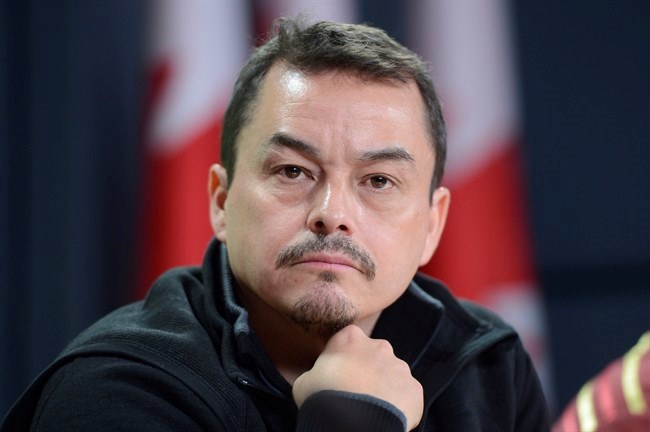OTTAWA - The plans for Stephen Harper's high-stakes meeting with First Nations leaders on Friday are awash in confusion.
After a week of frenetic meetings and back-and-forth among top chiefs, advisers, elders and top government officials to plan a four-hour meeting with the prime minister on Friday afternoon, large swaths of First Nations leaders denounced the process on Thursday night.
Instead, they declared they will only meet Harper on their own turf, on their own terms — a declaration that has largely isolated the head of Canada's largest aboriginal group, Shawn Atleo, and also amounts to a clear rejection of the prime minister's authority.
"The door's open. We expect the (prime) minister to come here and meet with us," said Murray Clearsky, southern Manitoba's grand chief.
One region after another declared that it was supporting Attawapiskat Chief Theresa Spence in her call to refuse a meeting with Harper unless Gov.-Gen David Johnston was at his side.
"This is not simply one chief making demands on location and format for a meeting. Chief Theresa Spence is merely setting forward a call for truth and integrity from the prime minister," said Isadore Day, a chief from northern Ontario. "She fights on behalf of over a million indigenous peoples in this country."
Even if the meeting with Harper proceeds, Day predicted only a handful of chiefs would attend.
"There will clearly be no mandate to negotiate."
Still, earlier in the day, the chiefs had overcome regional tensions and actually agreed to a united, concrete list of demands that they wanted to present to Harper.
They want to see a school and clean drinking water on every reserve. They want Ottawa to commit to a national inquiry into the hundreds of missing or murdered aboriginal girls and women. They want a top-level political commitment to modernize and implement treaties so that First Nations share in the wealth of Canada's resources. They want stable funding that grows with population and inflation.
And they want Harper to repeal major parts of his two budget omnibus bills that they say sacrifice environmental protection to resource extraction.
Atleo vowed to take those concerns forward on Thursday night in a humble but emotional plea for unity from chiefs.
"This is not a perfect organization and I am not a perfect person. I accept a share of responsibility and I have responded to criticisms," Atleo told a crowded room of boisterous chiefs and delegates.
"We need to continue to stand united — chiefs, delegates....If we are to be divided at a moment like this, the governments will see that."
What he left unsaid was whether any meeting with Harper would take place at all, or how he would proceed.
He then left the conference hall, with insiders indicating he would work through the night with his executive in order to figure out the best way forward.
Some of his allies insisted he would meet with Harper and cabinet ministers as planned on Friday afternoon — in private, in the prime minister's office with a relatively small delegation of chiefs.
"It is our intention to move forward with the meeting," said B.C. Regional Chief Jody Wilson-Raybould.
Others suggested they send a delegation of women to meet Harper and negotiate future meetings with all chiefs.
Atleo himself suggested he would hold the meeting on Friday with Harper, and then push for a broader meeting on January 24th, and a commitment to hold broad, open meetings with chiefs at regular intervals.
"We need them to commit to sit with you on a regular, ongoing basis, look you in the eye the way it was done in the treaty-making, in a sacred manner. And let's transform this relationship. Because our kids are dependent on every single one of us," he said.
But other chiefs said the only way any legitimate conversation would take place on Friday is if Harper and Johnston come to them, in a large open venue.
"The doors are wide open to come and sit with the leadership … to reconnect, rejuvenate and refurbish … the doors are open. We’re hoping and we’re praying for that," said Saskatchewan Regional Chief Perry Bellegarde, who had earlier in the day been by Atleo's side.
Atleo was expected to spend most of the night seeking clarity and direction from the chiefs who elect him and without whose support he has no mandate.
His rival from last summer's elections for national chief, was delighted with the turn of events.
"This is all good. We are standing up for our people again. The chiefs have said we're the decision-makers. We're going to have a nation-to-nation relationship and this is good for our people. This is what they asked for," said Pam Palmater, an expert in indigenous governance who is also a de facto spokesperson for the Idle No More movement of grassroots protesters.
"The chiefs have said we're not meeting with Harper. So if AFN decided to meet with Harper, it wouldn't be a valid meeting. Because the AFN only has authority when chiefs give them authority. The chiefs have said we don't give them that authority."
The stakes for the Harper meetings are high.
They were meant to fuse energy into talks to modernize treaties and discuss economic development, while also quelling a growing wave of protests and blockades organized by the Idle No More movement that has found inspiration in the form of Chief Spence.
Atleo and other chiefs warned sternly on Thursday that without meaningful action from the federal government, Canada should expect more unrest.
"We've got the geography covered," Manitoba Grand Chief Derek Nepinak told a news conference Thursday. With First Nations and their supporters mobilizing across the country, they have the power to "bring the Canadian economy to its knees."



